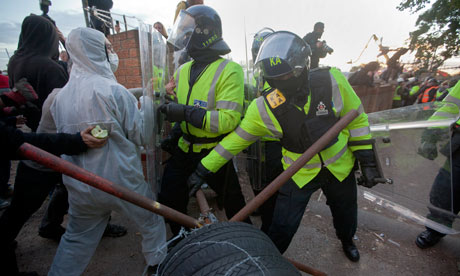Dale Farm: why the media had to spike the police's scattergun
It's vital for independent journalism that broadcasters don't have to hand over footage, writes ITN chief executive John Hardie
Dale Farm: vital for the media to draw a line in the sand. Photograph: Sean Smith for the Guardian
Today we witnessed a landmark ruling on the distance that must be maintained between the state and the media. A high court judgment quashed a wide-ranging production order that sought to force ITN, the BBC, Sky, Hardcash Productions and freelance photographer Jason Parkinson to hand more than 100 hours of unbroadcast footage of the Dale Farm evictions to Essex police.
If we had lost this case then the bar would be so seriously lowered for any such future requests that TV cameras could effectively be seen as police surveillance equipment.
We are not agents of the state.
And we felt it was important to fight this case to draw a line in the sand that clearly separates – in the eyes of the law as well as in democratic principle – the roles of the police and newsgatherers.
We had vehemently contested the Dale Farm production order on the grounds that its speculative nature meant that there was no evidence that our footage would be of substantial benefit to the police's investigation and that the request contravened the right to freedom of expression as described in article 10 of the European convention on human rights.
After the disappointment of losing the case at Chelmsford crown court, we took our appeal to the high court by way of judicial review to argue that the orders to hand over footage should not have been made.
This result helps ensure that journalists and cameramen are not seen as an extension of law enforcement and protects the safety of our staff. In the words of Lord Justice Moses and Mr Justice Eady, who handed down today's high court ruling, "it is the neutrality of the press which affords them protection and augments their ability freely to obtain and disseminate visual recording of events".
The court application by police was a fishing trip to identify suspects in unbroadcast footage from the Dale Farm evictions. It was just the latest in a worrying trend to force disclosure of footage. This trend may be linked to the increase in public disorders and demonstrations in recent times. If so, then it is even more important to report such events fearlessly and impartially, lest we risk jeopardising the public's faith in independent journalism.
The Dale Farm order was a nadir because there was simply no evidence that we had any footage of specific value to Essex police. As today's ruling stated: "The speculative nature of this exercise is perhaps underlined by the scattergun approach towards identifying the material sought." Well, now it is time to put the scattergun down.
Yes, we will of course continue to listen to police requests that relate to specific acts of serious criminality – it would be irresponsible for us not to do so.
Media organisations should not consider themselves to be arbiters of the law.
But in our democracy the neutrality and objectivity of independent newsgatherers must be respected. There would have been outrage if we had been ordered to hand over footage of our reporting in Bahrain or Syria to authorities in those countries. We should not be expected to compromise our own position on these shores either.
There is no doubt that today's judgment has set an important precedent for any future police applications to commandeer footage.
What I hope to see come from this ruling is for the police and courts to now take an intense focus on evidence before applying and granting any orders.
It is one thing for the police to believe that a few seconds of our footage may assist an investigation into a specific incident of serious criminality.
It is completely different for them to deploy their scattergun and hope for the best.
• John Hardie is chief executive of ITN
http://www.guardian.co.uk/media/2012/may/17/dale-farm-media-police?CMP=twt_fd

